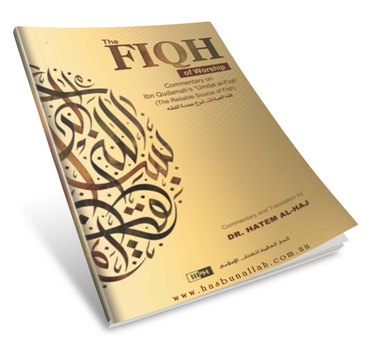Commentary on ‘Umdat al-Fiqh (The Reliable Source of Fiqh)
Author: Imam Ibn Qudâmah al-Maqdisi
Commentary and Translation by Dr. Hatem al-Haj
The Fiqh of Worship is a translation of and commentary on Ibn Qudâmah’s highly esteemed ‘Umdat al-Fiqh, an abridged book of fiqh (Islamic jurisprudence) according to the Hanbali school. Dr. Hatem al-Haj has translated and elaborated on it, noting the opinions of other schools of Islamic jurisprudence, thus giving the English-speaking student a broader base for his or her understanding of fiqh. The author has made the difficult subject of fiqh easier to learn and more comprehensible by using visual aids and a unique symbol system. This book is a must-have for the serious student of knowledge. In the author’s words: This knowledge will only be beneficial if it is sought for Allah’s sake, coupled with compassionate devotion towards Him and diligent adherence to the way of our most beloved, Prophet Muhammad (blessings and peace be upon him). It will be retained only by frequent reviews, and confirmed by teaching it to those who are less knowledgeable. Worship, when devoutly observed and correctly performed, is the ultimate human function for which people were created, and the only way to attain the ultimate success, being the pleasure of our Lord (Exalted is He).
About the Author – Imam Ibn Qudâmah al-Maqdisi:
He was a distinguished scholar of fiqh, known for his mastery of fiqh knowledge and principles and for his wisdom in promoting the correct practice of Islam. Ibn Katheer said of him: “There was not found in his era nor before it by a long span of time, anyone possessing more fiqh—understanding of the religion—than him.” Ibn Taymeeyah and others also said the same. Born in 541 H (1147 CE) in Nablus, Palestine, Ibn Qudâmah began his Islamic studies at a young age, eventually studying under many scholars in Damascus, Badgdâd and Makkah. He wrote more than thirty books on fiqh, Hadith, ‘aqeedah (creed) and zuhd (spirituality and asceticism), though he is most famous for his books of fiqh al-Mughni and ‘Umdat al-Fiqh, both considered textbooks of Hanbali fiqh. Always striving to fully implement the teaching of Islam in his own life, Ibn Qudâmah participated in jihad with the forces of Salâh-ad-Deen as they conquered Jerusalem. He died at the age of 79 in his home in Damascus.
Download Book Size: 1.5 MB | Downloaded 753 times

